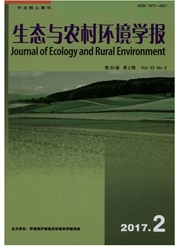

 中文摘要:
中文摘要:
小桐子(Jatropha curcas)是生物质能源原料树种,被称为生物柴油树,具有较强的抗环境胁迫能力,可用于生态脆弱环境的植被恢复和污染土壤的植物修复,达到能源与环境双赢的目的.通过室内盆栽试验研究不同浓度镍(0、500 和1 000 mg·kg^-1)对小桐子光合特性、形态特征及水分利用的影响,旨在探索小桐子适应镍污染土壤的生长调节和水分高效利用机制.结果表明,小桐子株高变化量、茎粗变化量、净光合速率(Pn )日变化、蒸腾速率(Rt)日变化、壮苗指数、胡伯尔值和灌溉水利用效率(Ei,w,u)均随镍浓度的增加而显著降低(P〈0. 05),但叶片水分利用效率(Ew,u)和植株根区土壤含水率随镍浓度的升高而升高.与Ni0(对照)相比,Ni1 处理对植株气孔导度(Gs)的影响不显著(P〉0. 05),而Ni2 处理植株Gs显著降低(P〈0. 05).由于镍显著降低小桐子的Rt,影响植株根系向冠层传输水分的能力及通过其边材横截面向叶片供水的能力,从而使得Ei,w,u显著降低,最终导致植株总干物质质量显著降低.但值得注意的是,小桐子通过提高叶片Ew,u 来缓解因蒸腾作用显著降低而引发的植物水分胁迫,使其能够在重金属镍污染土壤中生长.在该试验条件下有利于小桐子生长的土壤最高镍污染浓度为500mg·kg^-1.
 英文摘要:
英文摘要:
Jatropha curcas is a kind of tree that can be used as raw material for production of bio?energy, and hence called bio?diesel tree. As it is also quite high in tolerance to environmental stresses, it can be used as pioneer plant in restoring vegetation in ecologically fragile environment and in phyto?remedying polluted soils as well, therefore, planting this kind of trees may achieve the win?win goal in both energy and environment. An indoor pot experiment was carried out to explore effects of concentration of heavy metal nickel ( Ni) ( 0, 500 and 1 000 mg·kg-1 ) on photosynthetic properties, morpho?logical characteristics and water utilization of Jatropha curcas and mechanisms of the plant regulating its growth and utili?zing efficiently soil water, while adapting to Ni?polluted soils. Results show that plant height growth rate, and breast?height diameter growth rate, diurnal variation of net photosynthetic rate ( Pn ) , diurnal variation of transpiration rate ( Rt ) , robust seedling index, Huber value, and irrigation water utilization efficiency ( Wi,u,e ) were all decreased significantly ( P<0?05) , while leaf water utilization efficiency ( Ew,u ) and soil moisture content in root?zone of the plant increased with in?creasing nickel concentration. Compared with CK( Ni0) , Treatment Ni1 did not have much effect on stomatal conductance ( Gs ) of plants( P>0?05) , but Treatment Ni2 did ( P<0?05) . As nickel contamination significantly reduced Rt of Jatropha curcas, and affected the plant′s water transport capacity from roots to shoots and its capacity of water supply to leaves per cross?sectional area of sapwood, it significantly reduced Ei,w,u of the plant and eventually total dry mass of the plant. How?ever, it is worth noting that by increasing its Ei,w,u of leaves to significantly mitigate the water stress caused by reduced transpiration rate, the tree is able to grow in Ni?polluted soils. In this experiment, the highest concentration of nickel in the soil still conducive to growth of Jatropha curcas was up
 同期刊论文项目
同期刊论文项目
 同项目期刊论文
同项目期刊论文
 期刊信息
期刊信息
